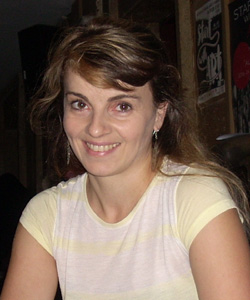The Alma Alter theatre university laboratory at the St. Kliment Ohridski University, Sofia offers comprehensive drama tuition. At the artistic laboratory it goes without saying that actors must develop their own abilities, cope with any given acting task, but also with any and all challenges connected with the theatre stage. They must be capable of directing a play, creating its choreography and ultimately, presenting it to an audience.
The Alma Alter actors say they do not need costumes or theatrical scenery. The only thing they rely on is the live, direct contact with the audience. For the most dedicated students there is a two-year professional training programme in authorial theatre.
 “Here, we work in a studio that has cutting-edge audio-visual technology. The management has a keen sense of what young people need, and that includes disadvantaged students,” says Petya Yossifova, choreographer and director of the university theatre:
“Here, we work in a studio that has cutting-edge audio-visual technology. The management has a keen sense of what young people need, and that includes disadvantaged students,” says Petya Yossifova, choreographer and director of the university theatre:
“There are people who have been coming through the years to watch every single play we have staged because it is new and different. In this sense we have been taking the liberty of using theatre to raise issues that are important in the life of society, to experiment with different solutions so as to invoke reflection and arouse feelings.”
The young Alma Alter company is now facing a major challenge. It is called 24-hour theatre and is a stage marathon in different halls of the university to mark 25 March – World Theatre Day. The event is invariably on the calendar of the St. Kliment Ohridski University, but this time it involves the visually impaired. The university administration is particularly mindful of students with special needs, says Petya Yossifova who has already selected 30 disabled young people and is expecting to add more to the group:
“This year we decided to put together a group of 30 students with no eyesight problems and 30 who are visually impaired, 10 actors plus the organizers and see whether they can all be friends and at the same time solve a serious social problem. Our idea is to see whether art and more specifically theatre can bring people together, help them address their problems and offer them solutions, though not in words but by experimenting with concrete problems. We will have completed the show and we shall be presenting it to an audience on 25 March. Right now we are putting the groups together. This new project of the Alma Alter theatre laboratory will bring to the surface problems we encounter at the university every day. For instance – wanting to do something that will benefit people but not being able to do it because it will take a lot of time, effort, contacts etc., before it can be brought to fruition.”
English version: Milena Daynova
The connection between Bulgaria, "Dali's Moustache" and Picasso is a topic that could remain widely discussed in the next few years, and perhaps even decades. The reason for this is not related to new technologies and artificial intelligence, nor to..
The latest project by director Stefan Komandarev, "The Block Universe", is one of the 35 selected projects at the most important global forum for film co-productions, the Berlinale Co-Production Market. Every year there are hundreds of candidates,..
The latest Bulgarian film "Before I Forget" can be seen in cinemas from today. It depicts the sad reality of one of the most common modern diseases - dementia. Screenwriter Teodora Stoilova-Doncheva was inspired by real events. The film is..
Just a few weeks after being proclaimed Writer of 2024 at the annual Sofia City Library awards and after her Nishka (Thread) was declared novel of the..

+359 2 9336 661
